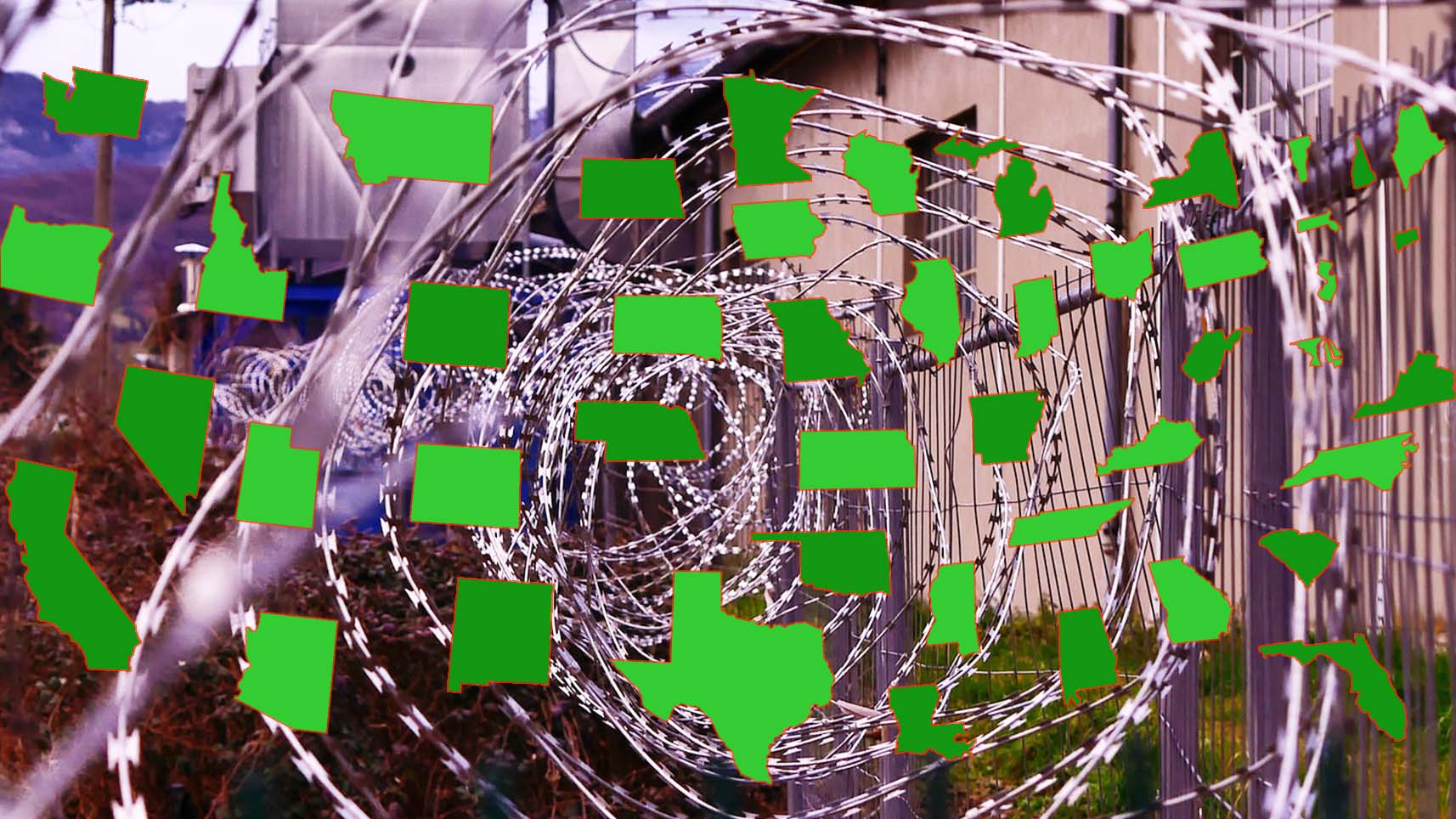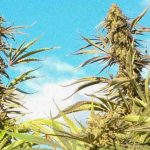We need cannabis prison reform. Our criminal justice system hold the highest amount of prisoners in the world per captia. The United States’ War on Drugs has devastated millions of American lives since President Nixon launched it and President Reagan shifted it into high gear. A major contributor to the unnecessary arrests, and families being destroyed, is the fact that cannabis is targeted by this war. Cannabis has been on the Drug Enforcement Agency’s Schedule 1 list of controlled substances alongside hard drugs like heroin and cocaine since 1970. However, it’s been used therapeutically, medicinally, ceremonially and recreationally by humans for millennia. Criminal justice reform is one of the slowest moving sections of our political spectrum. Will America ever catch up?
With legislation changing around cannabis use in many states, how are states dealing with changing existing laws? What are they doing for the folks who have prior arrests or are currently incarcerated for cannabis related crimes?
What is cannabis prison reform?
Cannabis prison reform refers to changing the way that rules around cannabis use and punishment operate and affect people. Wikimedia characterizes prison reform as “the attempt to improve conditions inside prisons,” but also to make the penal system more effective, working hand in hand with alternative sentences that don’t include incarceration. It includes ensuring that those who have been negatively affected by having a past cannabis crime on their record are treated fairly and equitably [1].
Do we need cannabis prison reform?
We do. Many states in the U.S. are adopting medical use or adult use legislation to allow citizens to use cannabis within certain guidelines. Meanwhile, cannabis with more than .3% per dry weight is still an illegal controlled substance by federal Drug Enforcement Agency (DEA) rules.
Some parts of our culture and hence some of our societal systems have come to think of marijuana users as criminals first, rather than categorizing them as what they are: natural health remedy users caught up in hyper criminalization of a natural remedy. This is largely based on the ignorance, fear, and racism that initially led to cannabis prohibition in the U.S. The decades-old deception has found roots as a cultural concept even though the cannabis plant and its components have vast potential as a set of beneficial health tools.
It is easy to find propaganda that says cannabis users are degenerate and that marijuana is a gateway drug to harder drugs. The DEA itself states that Schedule 1 drugs have “a high potential for abuse,” “no currently accepted medical use in treatment in the U.S.,” and “a lack of accepted safety for use of the drug, substance, or chemical under medical supervision [2].”
The claims are dubious for cannabis though. Regarding the first, “a high potential for abuse,” the government defines using an illegal drug itself as abuse, and the government defines marijuana as an illegal drug. So the mere use can be termed abuse. This circular thinking doesn’t define abuse in a meaningful way. Is addiction a fair measure? Research has shown some evidence that approximately 9% of cannabis users may develop addiction to it. But looking closer, those studies may use marijuana “dependence” to mean the same as “addiction.” The two issues are quite different. Dependence means that a person feels withdrawal symptoms when stopping use, whereby addiction means the person can’t stop even though use is harming them [3]. The 9%” finding may therefore be much lower or irrelevant.
Second, what about “no currently accepted medical use in treatment in the U.S.?” The U.S. Food and Drug Administration (FDA) has already approved cannabis-derived and cannabis-analog health products that are available if prescribed by a licensed healthcare provider [4].
The cannabis-derived drug product is called Epidiolex, which is mainly a purified form of cannabidiol (CBD). It has been approved for treating seizures associated with Lennox-Gastaut syndrome or Dravet syndrome. The FDA says this particular drug product is safe and effective for its intended use [4].
Three synthetic cannabis-related drug products have also been approved. Marinol and Syndros both contain the active ingredient dronabinol, a synthetic Delta-9 THC, and are approved for therapeutic uses including for nausea from cancer chemotherapy and for the treatment of anorexia associated with weight loss in AIDS patients [5]. Nabilone, another synthetic cannabinoid similar to THC, is the active ingredient in Cesamet which is “indicated for the treatment of the nausea and vomiting associated with cancer chemotherapy in patients who have failed to respond well to normal antiemetic treatments [6].” If these drugs are approved, how can there be no accepted medical use?
The third schedule claim is “a lack of accepted safety for use of the drug, substance, or chemical under medical supervision.” Medical literature does not show instances of fatal cannabis poisoning, and no studies associate it with direct risk of death or other problems at a meaningful level [7]. Plus, as we looked at above, medical uses of cannabis-based drugs are indeed available with medical supervision, as approved by the FDA.
We need more data but it’s been difficult to acquire, partly because the prohibition on cannabis meant that actual scientific research of the plant was somewhere between extremely difficult and impossible to do [8]. In recent years, many states have approved medical and adult marijuana use, and the DEA removed hemp from the Schedule 1 list of controlled substances with the 2014 Farm Bill and 2018 Farm Bill. These changes brought a push for more and better research. Opportunities to gather hard data are growing and we look forward to more comprehensive research and results in the future.
More money, more problems
The corrections industry has run rampant. Mass incarceration and minimum sentencing have lead to the incredibly high amount of incarcerated Americans. Overcrowding and underfunding of governmental facilities naturally followed the incarceration surge, creating a need for privatized prisons. So there is financial incentive to these private prison companies to maintain the status quo, including keeping cannabis illegal. This is associated with issues with the Prison Industrial Complex (PIC) at large. The PIC is “the expansive network of people and parties with vested interests in mass incarceration” that supports mass incarceration [9]. The PIC is a much larger problem but drug crimes play a major part, perhaps being the biggest force behind giant increases in mass incarceration of recent decades [9].
2020 estimates were that 2.3 million people were incarcerated in the US, with another 4.5 million on parole or probation [9]. The numbers are staggering, especially if you factor in the other people who are affected when one person goes to jail for cannabis. Should we multiply by 3 since the average family size is 3.15 people [10]? Should we multiply by 9 since that’s the average number of close friends a person has [11]? Or many more, since our tax dollars pay the astronomical price for all this, up to $182 Billion annually [12]!
States making progress
Long term progress means fixing the system and preventing the arrests and subsequent woes of the criminal cycle that harm people. Some states are making headway in this regard. One tool that States have is creating legal access to cannabis. As of late-2021, 36 U.S. States and territories allow medical use of marijuana [13], and 21 States and territories permit its adult use [14]. Given that using cannabis (within the rules) is not against the law in these states, arrests will not happen, and the number of people caught up in the system should decrease dramatically.
California was the first state to sanction medical use in 1996 [15], and in 2012, Colorado and Washington were the first to allow recreational adult use [16].
The latest states to make the change in 2021 are:
- New York – legalized recreational cannabis
- Virginia – legalized recreational cannabis
- New Mexico – legalized recreational cannabis
- Connecticut – legalized recreational cannabis
- Alabama – legalized medical cannabis
Honorable mentions to:
- South Dakota – recreational cannabis initiative was overturned by circuit-court
- Mississippi – medical cannabis initiative was overturned by state supreme court
Which states will legalize cannabis next?
Some in the industry think we’re getting closer to federal legality. In lieu of that, some of the remaining states without marijuana laws are pushing medical and adult use initiatives, and there is pressure for lawmakers to take action [17].
- Maryland – an adult use bill failed in 2021. It may return as a referendum vote in 2022
- Missouri – legislation is proposed to create an adult use market
- Oklahoma – a constitutional amendment allowing adult use was proposed for 2022
- Ohio – the state process is complicated but an “initiated statute” may be on the ballot in 2022
- Arkansas – efforts are behind a 2022 amendment to allow adult use
- Pennsylvania – advocates are working on proposals and there seems to be some bipartisan support for legalization
- Florida – advocates are working to have an initiative on the 2022 ballot
In the mean time, to learn more about Delta-8’s legality, check out: Is Delta-8 THC Legal in Your State?
The Federal approach to legalizing cannabis
Does real reform need to come from the national level? It would help. We must remember that cannabis in any form with more than .3% Delta-9 tetrahydrocannabinol (THC) is still a federally-controlled Schedule 1 substance, and illegal on a national basis.
The 2018 Farm Bill introduced a new concept on the cannabis front. The Bill stated that the federal government considers cannabis with less than .3% Delta-9 THC (the main psychoactive component of cannabis) per dry weight to be “hemp.” Cannabis with more than .3% Delta-9 THC per dry weight is considered illegal “marijuana.” Under the Bill, all other plant material and substances derived from legally-defined hemp are also federally-compliant [18].
The distinction is at once helpful and frustrating. It is helpful due to the fact that in states without sanctioned medical or adult use rules, people can use hemp-derived cannabinoids without fear of breaking the law. This access is crucial for many people who find therapeutic benefits from high CBD, low THC cannabis products like CBD Oil that they can now legally purchase under the Farm Bill.
The hemp/cannabis distinction is frustrating because it unnaturally defines two plants from one, based on a seemingly arbitrary amount of one of the plant’s hundreds of components. Without clearer federal regulations, states make their own laws independent of the federal government’s, and the landscape is further complicated 50 times over.
Possible Federal action to legalize cannabis
In November 2021, Republican Representative Nancy Mace from South Carolina proposed the States Reform Act, or H.R 5977 – To amend the controlled substances Act regarding marihuana, and for other purposes. Mace says a “super-majority of Americans support an end to cannabis prohibition,” and the Act would remove cannabis from Schedule 1 and allow states to control it locally [19]. It remains to be seen how much support and momentum will build around this push. If passed, the Act would also help people who have been arrested for federal cannabis crimes. It would mean release from incarceration, and expungement of criminal records for federal cannabis offenses. The key word is “federal” because states would deal with the expungement of state cannabis offenses through their own judicial systems.
Clearing the record
As misinformation about marijuana is corrected, and laws around it are reformed, it is equally important to help people convicted for breaking those laws in the past. It expresses respect for the law and for citizens, and acknowledges that the law is flexible and equitably applied. Furthermore, convictions have collateral consequences like limits to accessing government benefits and restrictions on licensure [20]. It is doubly unfair to subject people to these effects if the law is no longer the law! So it is encouraging to see that H.R. 5977 is addressing this for federal offenses. States would be in charge of dealing with it for state cannabis offenses.
Three of the states mentioned above, that are looking at legalization in 2022, include expungement of past convictions in their proposals. Missouri’s plan includes “automatic expungement” of past cannabis convictions. Ohio’s plan would do the same for many past nonviolent cannabis convictions. Arkansas would similarly reverse convictions for some people serving time for nonviolent cannabis convictions.
States that have previously legalized have also addressed past marijuana convictions at differing levels of success. In fact, 41 states and territories have record-clearing provisions that can apply to cannabis convictions [OO]. This doesn’t mean that it’s easy to clean up one’s record. For instance, in Illinois, a recent state to legalize, certain “minor cannabis offense” records are automatically expunged but others must be petitioned in court, possibly necessitating a lawyer’s help. Even if automatic expungement applies to one’s law enforcement record, their court records are not expunged and must be separately petitioned [21]. It all adds up to more disparity between states in terms of how they handle cannabis related legislation. Federal clarity could help minimize the discrepancies, but as in the case of H.R. 5977, might not.
How to help with cannabis prison reform
If you want to help fight injustice, stay informed of the laws in your state. Are there outdated, harsh, unfair, racist anti-drug laws where you live? Do your research, talk to your neighbors and representatives, vote on referendum ballots—make your voice heard. Here are three organizations doing important work in cannabis prison reform, who can use your support.
The National Organization for the Reform of Marijuana Laws (NORML) has been fighting for marijuana law reform and legalization since 1970. You can donate and get involved.
The Last Prisoner Project is dedicated “to freeing every last prisoner of the unjust war on drugs, starting with the estimated 40,000 individuals imprisoned for cannabis [22].” You help with donations or assisting with petitions and letter-writing drives.
The American Civil Liberties Union is dedicated to defending democracy and liberty. Your tax deductible donation will help.
Cannabis prison reform goes hand in hand with cannabis legislation generally. The more the two work together, the better the outcomes will be. Many states are making headway on their own and others are poised to continue the trend. Federal legalization and reform will go a long way to leading the country into the healthy and productive relationship with cannabis that advocates have imagined for decades. We get closer to that promise every day.
References
- Wikipedia: Prison Reform
- CSA Drug Schedule
- Drug Abuse.gov : Is Marijuana Addictive?
- FDA.gov – FDA and Cannabis Research and Drug Approval Process
- Politico.com – Legal Weed Scientists
- CBD Capsules for Oral Administration FDA.gov
- Healthline.com – Concerns with More Availability in Cannabis
- FDA.gov – Cannabis Research and Drug Approval Process
- Prison Divestment and Mass Incarceration
- Average Size of a Family in the US
- Americans Number of Friend Closeness and Friendship
- Prison Policy Reports on Money
- State Medical Marijuana Laws
- Civil and Criminal Justice Marijuana Overview
- Cannabis.ca.gov Laws and Regulations
- Wikipedia: Cannabis Laws in the United States.
- Leafly: These States Could Legalize Cannabis Next
- HIA Position on Delta 8 and Hemp Cannabinoids
- Mace House.gov – Representative Nancy Mace Introduces States Reform Act
- Civil and Criminal Justice Clearing Criminal Records for Cannabis Offenses
- Illinois Cannabis Expungement
- Last Prisoner Project







